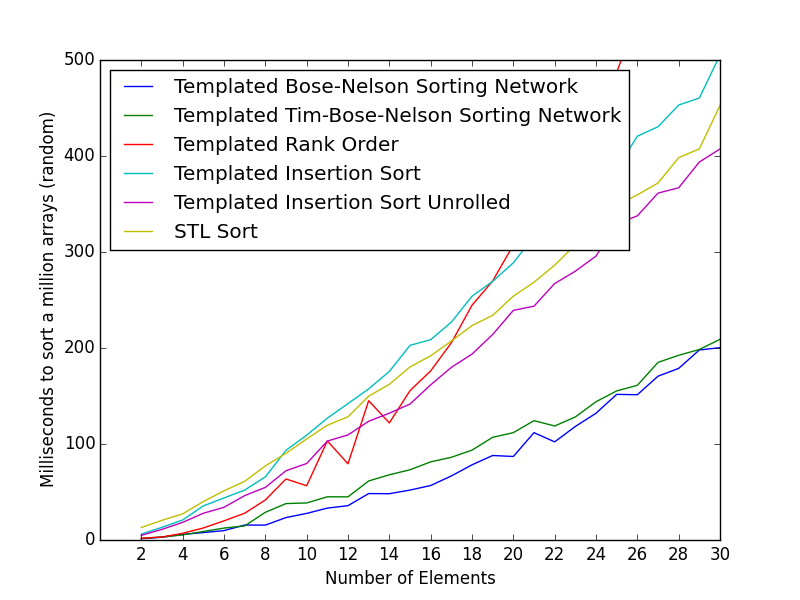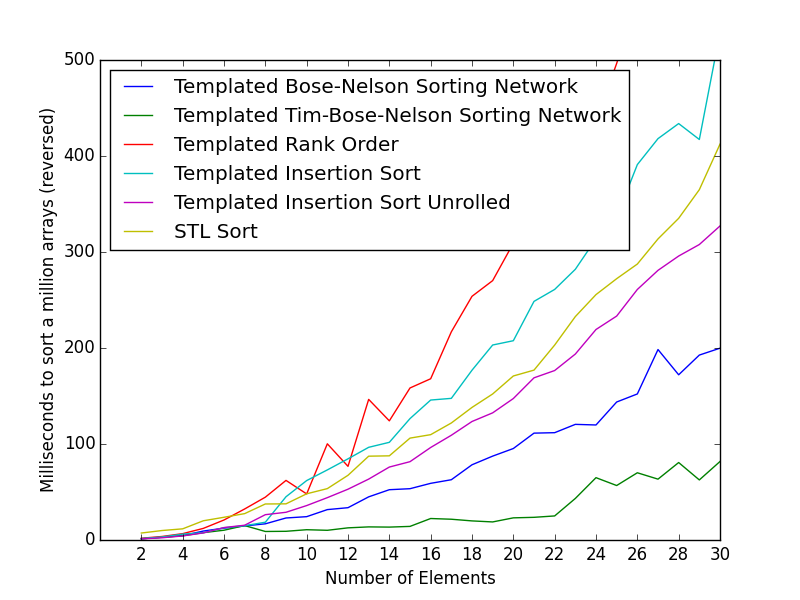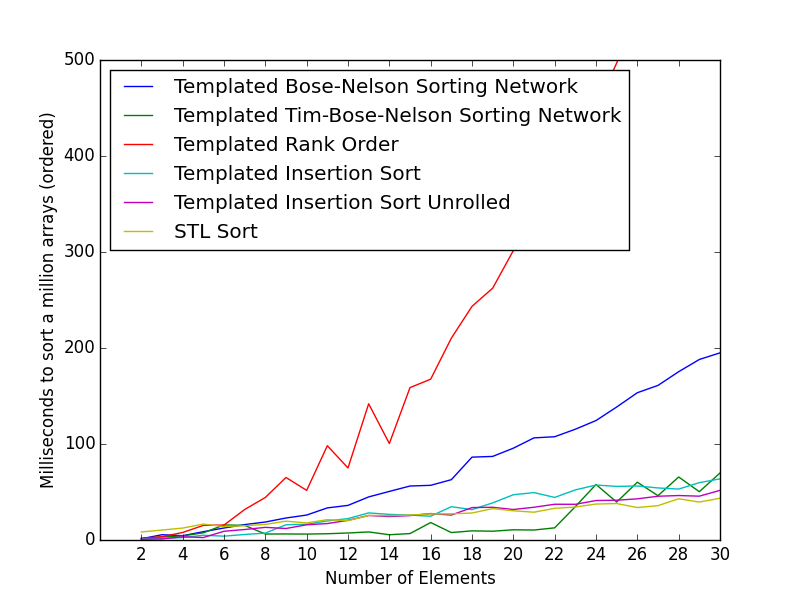A very simple header only C++ class to create a static sort.
Uses templates to generate a Bose-Nelson sorting network on compile time.
To enable the magic to happen, please turn on optimizations. =)
(-O2 or -O3 depending on your compiler)
Just copy include/static_sort.h into your project and #include it. =)
You can also copy and paste the code from static_sort.h directly!
A C++98 and above compiler.
// Fast for small randomly ordered arrays.
StaticSort<10> boseNelsonSort;
int a[10] = {6,7,3,2,4,0,9,1,8,5};
boseNelsonSort(a);
boseNelsonSort(a, std::less<int>()); // with less than comparator
// Fast for small arrays. Randomly ordered, reversed, in order.
StaticTimSort<10> timBoseNelsonSort;
int b[10] = {6,7,3,2,4,0,9,1,8,5};
timBoseNelsonSort(b);
timBoseNelsonSort(b, std::less<int>()); // with less than comparatorWorks on std::vectors, plain old arrays, or other array-like objects.
Accepts custom less than comparator.
Here are the number of milliseconds taken to sort 1 million arrays of ints.
Compiled with clang -O3, a Macbook Air (Mid-2012) Intel i7-3667U 2GHz.
Random Order
6,7,3,2,4,0,9,1,8,5 -> 0,1,2,3,4,5,6,7,8,9
Reversed Order
9,8,7,6,5,4,3,2,1,0 -> 0,1,2,3,4,5,6,7,8,9
In Order
0,1,2,3,4,5,6,7,8,9 -> 0,1,2,3,4,5,6,7,8,9
For real-world data, it is recommended you use StaticTimSort.
Here are the average clocks per sort against other static sorts from
[http://stackoverflow.com/questions/2786899/fastest-sort-of-fixed-length-6-int-array]
(Lower is better)
These timings are for randomly ordered arrays.
Clang -O3 :
----------
Direct call to qsort library function : 326.81
Naive implementation (insertion sort) : 132.98
Insertion Sort (Daniel Stutzbach) : 104.04
Insertion Sort Unrolled : 99.64
Insertion Sort Unrolled (Glenn Teitelbaum) : 81.55
Rank Order : 44.01
Rank Order with registers : 42.40
Sorting Networks (Daniel Stutzbach) : 88.06
Sorting Networks (Paul R) : 31.64
Sorting Networks 12 with Fast Swap : 29.68
Sorting Networks 12 reordered Swap : 28.61
Reordered Sorting Network w/ fast swap : 24.63
Templated Sorting Network (this class) : 25.37
Intel Compiler 16.0 -O3 :
------------------------
Direct call to qsort library function : 325.28
Naive implementation (insertion sort) : 97.38
Insertion Sort (Daniel Stutzbach) : 108.97
Insertion Sort Unrolled : 97.16
Insertion Sort Unrolled (Glenn Teitelbaum) : 109.65
Rank Order : 38.13
Rank Order with registers : 32.96
Sorting Networks (Daniel Stutzbach) : 85.56
Sorting Networks (Paul R) : 47.57
Sorting Networks 12 with Fast Swap : 41.13
Sorting Networks 12 reordered Swap : 37.42
Reordered Sorting Network w/ fast swap : 25.60
Templated Sorting Network (this class) : 29.09
If you want to sort pairs of 32-bit numbers (e.g. std::pair<int, int>),
it is recommended that you pack each pair of numbers into a single 64-bit number.
This will nudge the compiler to generate min/max instructions for fastest performance.
The overhead of packing and unpacking the pairs is negligible.
Sorting packed pairs is approximately 4-5x faster than sorting unpacked pairs.
At the time of writing, even the best modern compilers are unable to optimize this automatically.
For a simple example and benchmark, please look into bench_pair_sort.h.
It includes a little helper class for packing various types of 32-bit number pairs.
Use StaticTimSort.
Give it a star!
Let me know if you have used this library in any of your projects.
It helps me understand how it is used and plan new features.
10 June 2020
- Added example for sorting pairs.
17 Oct 2019
-
Added argument to accept a less-than comparator.
-
Added a TimSort inspired Tim-Bose-Nelson sort to handle the case of already ordered arrays.
This adds only a very tiny overhead, and is only activated for arrays of 8 or more elements.
On average, it beats all the other sorts (except for the sorting-network) on
random, in-order and reversed-order arrays. :)
- http://stackoverflow.com/questions/2786899/fastest-sort-of-fixed-length-6-int-array
- https://github.com/atinm/bose-nelson/blob/master/bose-nelson.c
MIT


